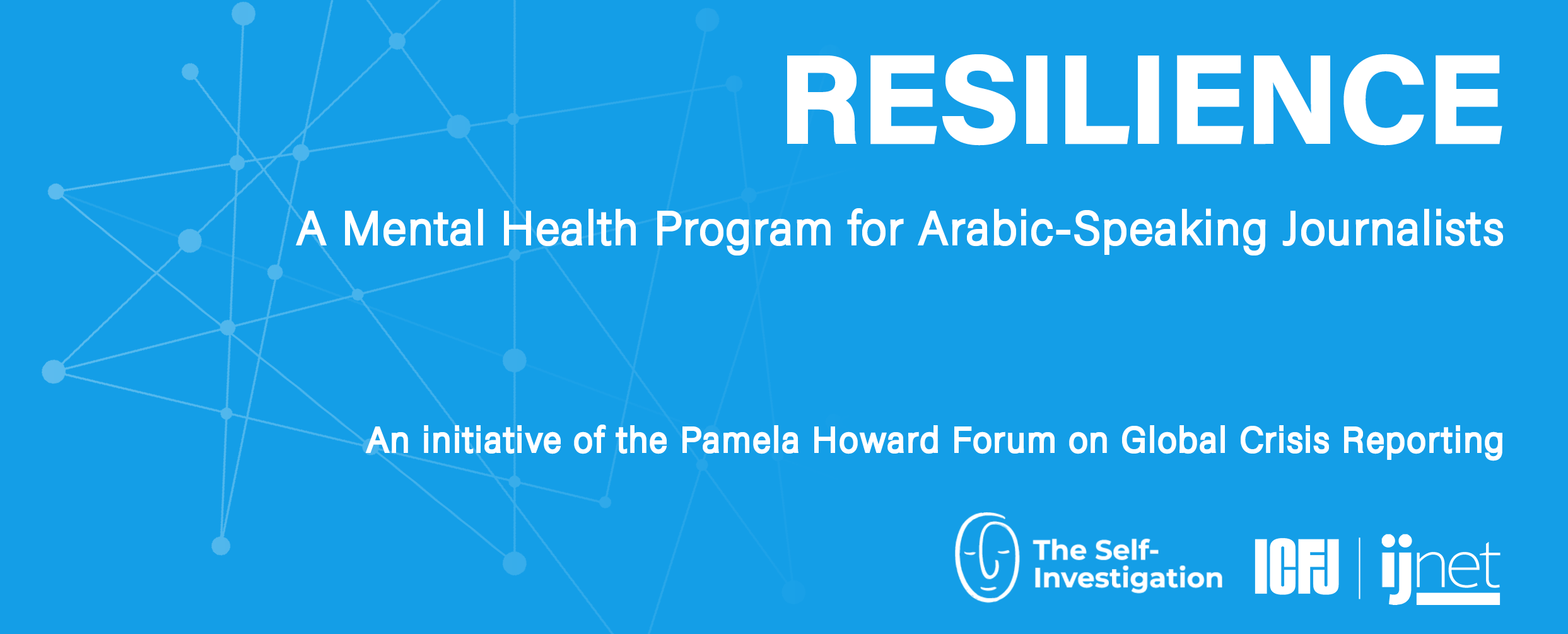Journalists across the globe are suffering unprecedented levels of stress, anxiety and lack of motivation in response to working in high-pressure environments in a rapidly shifting media landscape. Fatigue, burnout and mental health challenges are becoming more evident, especially in countries where conflict, political instability and crackdowns on media are increasingly common.
To adopt healthier work practices that can sustain journalists' well-being, ICFJ is launching a new resilience program for Arabic-speaking journalists under the auspices of the ICFJ Pamela Howard Forum on Global Crisis Reporting. The initiative aims to shed light on the importance of mental health and well-being for workers in the media industry and provide crucial resources in Arabic for journalists. It kicks off October 10 to mark World Mental Health Day and will run through the end of November. You can register for the first session here.

“This initiative will address a serious need for journalists in a region where mental health is still a culturally taboo topic,” said ICFJ Director of Community Engagement Stella Roque. “Journalists in the MENA region often work in high pressure environments — on the frontlines of conflict zones and in countries where free press is not a given. This program will give them the tools and skills to deescalate stress and build mental resilience.”
“We believe that journalism requires a change in the narrative about what it means to be a good journalist and, with this course and our online Academy, we promote a systemic change towards a less toxic work culture in the media,” said Mar Cabra, the Pulitzer-Prize winning investigative journalist who co-founded The Self-Investigation after her own personal experience with burnout. “I got burned out because I took my job more seriously than my physical and mental health.”
Highlights of the Program:
- Self-paced online course: Designed and produced by The Self-Investigation, a foundation that has already trained more than 2,000 journalists worldwide, this course covers stress management and digital overload for Arabic-speaking journalists. The course is open to all members of the Arabic-language ICFJ Forum (join the Forum here) and consists of easy-to-follow videos combining theory, tools, tips, guided practices and exercises. It is divided into four modules. Participants will gain stress awareness and stress-management skills, attention management, setting boundaries with the digital world, and emotional management. Click here for more information about the course and to register.
- Live training: Mental health and media experts from the Middle East and North Africa (MENA) region will conduct four sessions through the Forum, covering crucial topics such as mental health and journalism, online violence, strategies to deal with emotions, especially anxiety, and how to move forward and apply the program learnings. The sessions will run from October 20 through December 1st. Registration for the live sessions is available here.
- Mental health toolkit: ICFJ’s International Journalists’ Network (IJNet) will create this resource, tailoring it to the needs of Arabic-speaking journalists, especially those working in the MENA region. It will offer practical guidance and resources for journalists to build their mental resilience in stressful working environments and develop strategies to deal with various hazards related to their jobs, such as digital attacks, violence and much more. It will be available via IJNET Arabic.
ICFJ is immensely grateful to the dozens of individual donors who have made this program possible by contributing to the It Takes a Journalist initiative, which is designed to help journalists meet the most urgent issues of today. Their support allows ICFJ to flexibly deploy resources where they are most needed.
About ICFJ
The International Center for Journalists (ICFJ) empowers a global network of journalists to produce news reports that lead to better governments, stronger economies, more vibrant societies and healthier lives. We serve our community by providing training, mentoring, fellowships and financial support in investigative journalism, critical-issues reporting, media innovation and financial sustainability, as well as through cutting-edge research and resources. Learn more at icfj.org.
About The Self-Investigation
The Self-Investigation is a foundation that provides a variety of services aimed at improving media professionals’ well-being. It is led by multi-lingual, certified coaches and trainers with five decades of media experience combined. We use evidence-based practices so media professionals can relate to stress and digital overload in a healthier way. We have already trained more than 2,000 journalists in four continents in response to the negative impact of the COVID-19 pandemic. Besides The Self-Investigation Academy, our offerings include tailored-made courses for newsrooms and organizations and one-on-one coaching to support our clients’ specific needs. We strive to help under-served groups such as freelancers and women. Learn more at theselfinvestigation.com.